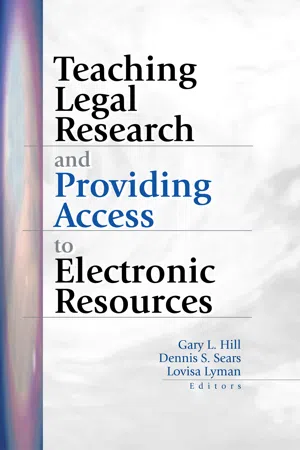
Teaching Legal Research and Providing Access to Electronic Resources
- 238 pages
- English
- ePUB (mobile friendly)
- Available on iOS & Android
Teaching Legal Research and Providing Access to Electronic Resources
About This Book
Teaching Legal Research and Providing Access to Electronic Resources is an essential guidebook to teaching lawyers and legal researchers how to find the information they need. Law librarians and reference librarians will welcome its timely, effective, and innovative techniques for facilitating their patrons'legal research. According to the MacCrate Report, legal research is one of the ten essential skills for practicing law, and educating users in research skills is a crucial part of the law librarian's job. Teaching Legal Research and Providing Access to Electronic Resources provides you with techniques for training your patrons in effective search strategies. This comprehensive volume will help you offer much more than a list of information on where the data is located. This helpful volume covers the full range of both users and resources, from helping first-year law students find cases in print to helping attorneys learn to use new Web sites and search engines. Its range includes academic, company, and public law libraries. Teaching Legal Research and Providing Access to Electronic Resources discusses formal ways to teach the skills of research, such as scheduled workshops, one-on-one tutorials, for-credit courses in law schools, and CLE-credit courses in law firms. In addition, it offers hints for seizing the teaching moment when a patron needs help doing research. Teaching Legal Research and Providing Access to Electronic Resources presents practical advice for all aspects of patron education, including: the rival merits of process-oriented versus results-oriented learning strategies;coordinating library education programs with courses in legal writing; teaching foreign and international legal research; using learning style theory for more effective classes; helping patrons overcome computer anxiety; lower-cost alternatives to Lexis-Nexis and Westlaw; using technology to deliver reference services.
Frequently asked questions
Information
Index
Table of contents
- Cover
- Half Title
- Series Page
- Title Page
- Copyright Page
- Contents
- About the Editors
- Introduction: Reference Services-Teaching Legal Research and Providing Access to Electronic Resources
- The Teaching of First-Year Legal Research Revisited: A Review and Synthesis of Methodologies
- Teaching Legal Research: A Proactive Approach
- Teaching Legal Research in a Government Library
- Teaching Legal Research in the Law Firm Library
- Perspectives on Teaching Foreign and International Legal Research
- Making the Connection: Learning Style Theory and the Legal Research Curriculum
- Success at the Reference Desk: Helping Patrons Overcome Computer Anxiety
- Electronic Research Beyond LEXIS-NEXIS and Westlaw: Lower Cost Alternatives
- The Internet Alternative
- Developing an Electronic Collection: The University of Minnesota Human Rights Library
- Building the Global Legal Information Network (GLIN)
- Copyright and Electronic Library Resources: An Overview of How the Law Is Affecting Traditional Library Services
- The New Reference Librarian: Using Technology to Deliver Reference Services
- Access Services: Linking Patrons to Electronic Legal Research
- Index